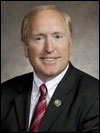Lawmaker pitches late flurry of recusal changes (UPDATE)
By: Jack Zemlicka, [email protected]//March 12, 2012//
Lawmaker pitches late flurry of recusal changes (UPDATE)
By: Jack Zemlicka, [email protected]//March 12, 2012//

With less than a week before the Wisconsin Legislature breaks for the year, Rep. Gary Hebl, D-Sun Prairie, introduced a flurry of bills to reform recusal and decision-making standards for judges.
Hebl co-authored eight proposals introduced Thursday, primarily aimed at the Wisconsin Supreme Court’s operation, in light of ongoing concerns about the high court’s standards for disqualification from cases.
“The court has had a lot of conflict of interest issues the last few years,” Mike Murray, a legislative aide to Hebl, said. “Wisconsin still has a subjective recusal standard that is far lagging behind other states.”
But the deadline for sending approved bills to Gov. Scott Walker’s desk is Thursday, and Murray acknowledged that the proposals are more symbolic than anything else.
However, Murray said Hebl, who chaired the Joint Legislative Council Study Committee on Judicial Recusal and Discipline last year, is likely to push the reforms again next session.
“I cannot imagine,” Murray said, “this is something he will take a pass on.”
Several of the proposals came directly from study committee recommendations, including a requirement that judges provide a written explanation when denying a request for disqualification (Assembly Bill 686) and that the Supreme Court assign an appellate court judge to break a tie if the justices deadlock on a judicial disciplinary decision (Assembly Joint Resolution 128).
In June 2010, the court split 3-3 and was unable to agree on how to handle the judicial ethics complaint filed against Justice Michael Gableman tied to a 2008 TV campaign advertisement.
But Milwaukee criminal appellate attorney Robert Henak, of Henak Law Office SC, said the Supreme Court is the only body that should have the final say on judicial discipline.
“The Supreme Court is elected statewide and you need to have a statewide body making the final determination on an ethics issue,” he said. “If it’s 3-3, that’s a decision. It shouldn’t be easy to find someone violated the rules of ethics.”
In 2009, Henak filed a motion with the Supreme Court to have Gableman removed from hearing criminal cases, citing the justice’s campaign for office revealed a bias toward the “prosecutorial arm of state government.”
Gableman denied the motion and discounted any potential bias.
Henak said he wasn’t satisfied with the explanation, but at least Gableman gave one, making it harder to review the decision.
![]()
“If the justice denies the recusal and doesn’t explain his or her reasons, that makes review more difficult,” Henak said. “But from justice’s perspective, it makes support of their position more difficult and adds to the appearance of bias.”
Justice N. Patrick Crooks testified twice before the study committee and said he supports legislation that would make recusal standards more objective. Specifically, he said Hebl’s proposal to allow the court to review an individual justice’s decision to deny a motion for recusal (AB 682), is a step in the right direction.
“At least on its face, it seems to be a positive reaction,” Crooks said. “Letting the court review the decision of another individual justice on recusal, I think is a very positive.”
Hebl also proposed standards for recusal regarding campaign donations. One proposal (AB 684) requires that contributors disclose donations within five days if the party has a pending matter before the judge.
Another bill (AB 685) requires that judges recuse themselves in any case where a party before them contributed $1,000 or more to a judge’s campaign within the four years preceding the case.
“Recusal is the last stop-gap people have to ensure there is a fair venue,” Murray said, “if they don’t have a lot of money to donate to campaign contributions for judicial elections.”
Murray said the goal of the introductions this legislative session is to plant the seed with Democratic and Republican lawmakers that changes need to be made.
“The representative put these forward to start a more robust debate,” he said “and hopefully ensure these standards become law.”
Legal News
- State Bar leaders remain deeply divided over special purpose trust
- Former Wisconsin college chancellor fired over porn career is fighting to keep his faculty post
- Pecker says he pledged to be Trump campaign’s ‘eyes and ears’ during 2016 race
- A conservative quest to limit diversity programs gains momentum in states
- Wisconsin prison inmate pleads not guilty to killing cellmate
- Waukesha man sentenced to 30 years for Sex Trafficking
- 12-year-old shot in Milwaukee Wednesday with ‘serious injuries’
- Milwaukee man convicted of laundering proceeds of business email compromise fraud schemes
- Giuliani, Meadows among 18 indicted in Arizona fake electors case
- Some State Bar diversity participants walk away from program
- Wisconsin court issues arrest warrant ‘in error’ for Minocqua Brewing owner
- Iranian nationals charged cyber campaign targeting U.S. Companies
WLJ People
- Power 30 Personal Injury Attorneys – Russell Nicolet
- Power 30 Personal Injury Attorneys – Benjamin Nicolet
- Power 30 Personal Injury Attorneys – Dustin T. Woehl
- Power 30 Personal Injury Attorneys – Katherine Metzger
- Power 30 Personal Injury Attorneys – Joseph Ryan
- Power 30 Personal Injury Attorneys – James M. Ryan
- Power 30 Personal Injury Attorneys – Dana Wachs
- Power 30 Personal Injury Attorneys – Mark L. Thomsen
- Power 30 Personal Injury Attorneys – Matthew Lein
- Power 30 Personal Injury Attorneys – Jeffrey A. Pitman
- Power 30 Personal Injury Attorneys – William Pemberton
- Power 30 Personal Injury Attorneys – Howard S. Sicula











